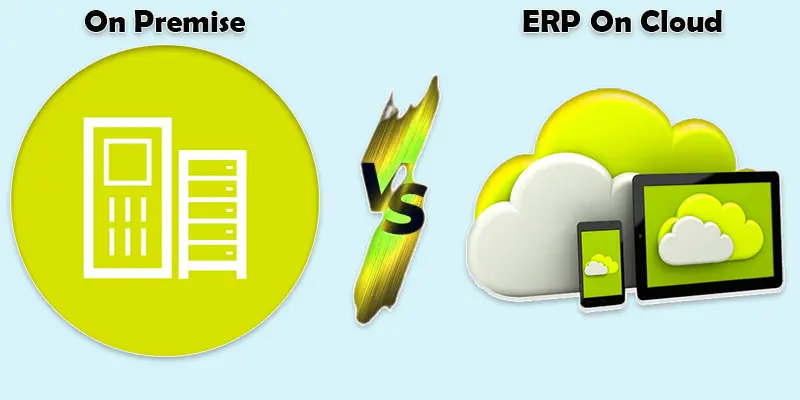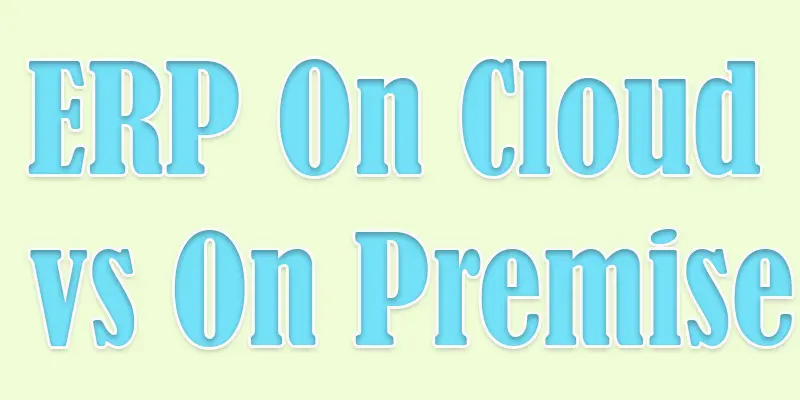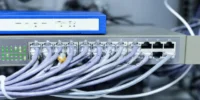ERP on Cloud vs On-Premise | Pros, Cons, and Major Differences
Published: 7 May 2025
Difference Between ERP on Cloud and On-Premise Systems
Many businesses today still struggle to decide between ERP on cloud vs on-premises, even though 60% of companies now prefer cloud solutions. Are you confused about which one fits your business better? You might worry about costs, setup, or control, and that’s totally valid. Whether you’re upgrading from spreadsheets or just heard someone mention ERP, understanding ERP on cloud vs on-premise can save you time, money, and stress.
What is Cloud ERP
Cloud ERP is a business software that runs on the internet. You can use it from anywhere without needing to install it on your own computers.
What is On-Premise ERP
On-premise ERP is software you install on your own computers at your office. You control everything, but it needs more setup and support.

ERP On Cloud vs On Premise for Growing Enterprises
The main difference between ERP on the cloud and on-premise is where the system is stored Cloud ERP runs online, while on-premise ERP runs on your own servers.
| Cloud ERP | On-Premise ERP |
|---|---|
| ERP software hosted online by a vendor. | ERP software installed and run on your own computers. |
| Net Suite, SAP Business By Design. | SAP ECC, Microsoft Dynamics GP. |
| Quick setup, often ready in days. | Longer setup, may take weeks or months. |
| Monthly or yearly subscription. | One-time upfront cost, plus maintenance. |
| Lower. | Higher. |
| Handled by a vendor. | Handled by in-house IT team. |
| Automatic and regular. | Manual and may require downtime. |
| Available anytime, anywhere with the internet. | Available only on the company network. |
| Yes, I need a stable connection. | No internet needed for daily use. |
| Managed by a vendor with strong cloud security. | Managed by your company—more control, more responsibility. |
| Limited but improving. | Highly customizable. |
| Minimal or none. | Required for setup, support, and updates. |
| Easy to scale up or down as your business grows. | Scaling needs more hardware and planning. |
| Included in service. | Needs to be managed by your team. |
| Depends on internet speed and vendor infrastructure. | Depends on your hardware setup. |
| Easy mobile access for remote teams. | Harder to access outside the office. |
| Small to mid-sized businesses or fast-growing startups. | Large companies with strict control needs. |
| Vendor controls most of the system. | You have full control over data and system. |
ERP On Cloud vs On Premise Pros and Cons for Businesses
Understanding the pros and cons of ERP on Cloud vs On-Premise helps businesses choose the right system based on cost, control, and flexibility.
Pros and Cons of ERP On Cloud
| Cloud ERP Pros |
|---|
|
| Cloud ERP Cons |
|---|
|
Pros and Cons of On-Premise ERP
| On-Premise ERP Pros |
|---|
|
| On-Premise ERP Cons |
|---|
|

Choosing between Cloud ERP and On-Premise ERP depends on your business size, needs, and how much control you want over your system.
Choose Cloud ERP if:
- You want lower upfront costs and pay-as-you-go pricing.
- Your team works remotely and needs access anytime, anywhere.
- You don’t want to manage hardware or IT maintenance.
- Your business is growing fast and needs easy scalability.
Choose On-Premise ERP if:
- You need full control over your data and system.
- Your company has strict security or compliance requirements.
- You already have a strong in-house IT team.
- You prefer a one-time investment instead of ongoing fees.
Conclusion About ERP on Cloud vs On-Premise Comparison for Small Business
Cloud ERP solutions vs on-premise ERP software is a decision every business must make based on its unique needs. In my opinion, if flexibility, cost-efficiency, and scalability are important to your company, cloud-based ERP systems are the better choice. I recommend evaluating your current infrastructure and long-term goals before making the final decision. Start by assessing the advantages and limitations of both options to make an informed choice.
FAQS
Yes, Oracle ERP can be on-premise, meaning it can be installed and run on your company’s own servers.
SAP ERP is available both on-premise and in the cloud, giving companies the choice to use either option.
NetSuite is a cloud-based ERP system, meaning it is hosted online and accessed via the internet.
An ERP MRP system helps businesses plan and manage production, inventory, and material requirements efficiently within their ERP software.
Cloud is better for flexibility, lower costs, and easier updates, while on-premise may offer more control but is often more expensive and harder to maintain. The choice depends on your business needs.

- Be Respectful
- Stay Relevant
- Stay Positive
- True Feedback
- Encourage Discussion
- Avoid Spamming
- No Fake News
- Don't Copy-Paste
- No Personal Attacks

- Be Respectful
- Stay Relevant
- Stay Positive
- True Feedback
- Encourage Discussion
- Avoid Spamming
- No Fake News
- Don't Copy-Paste
- No Personal Attacks





